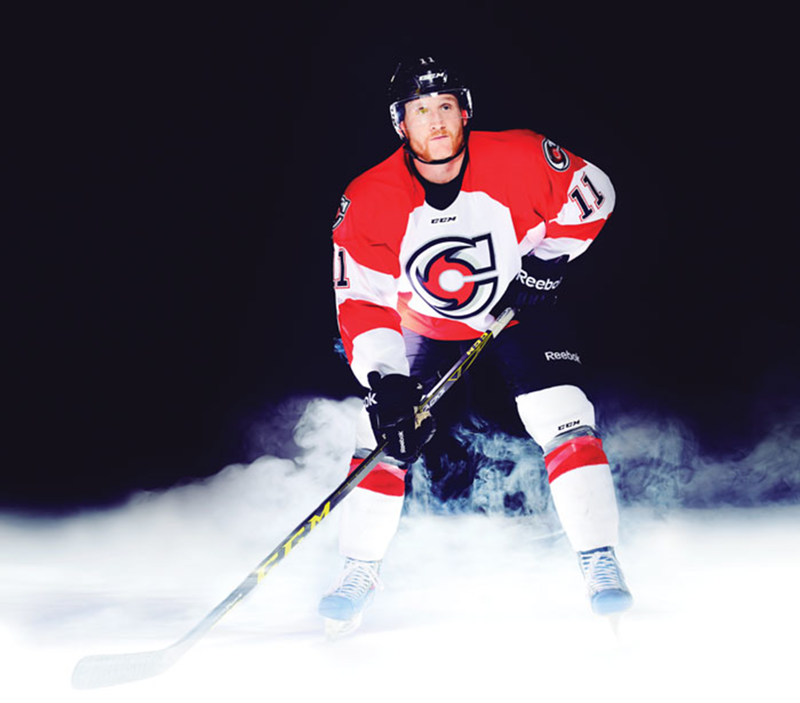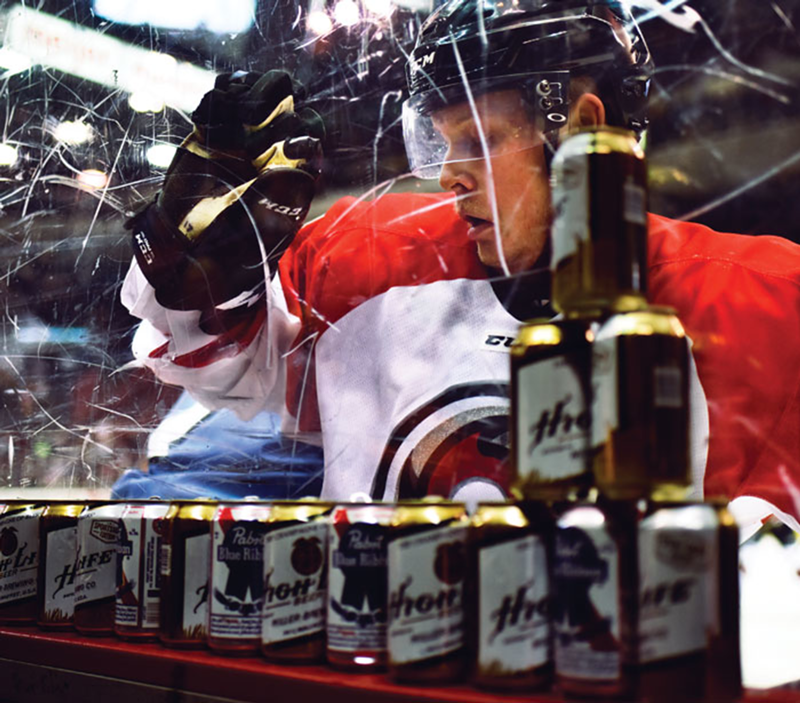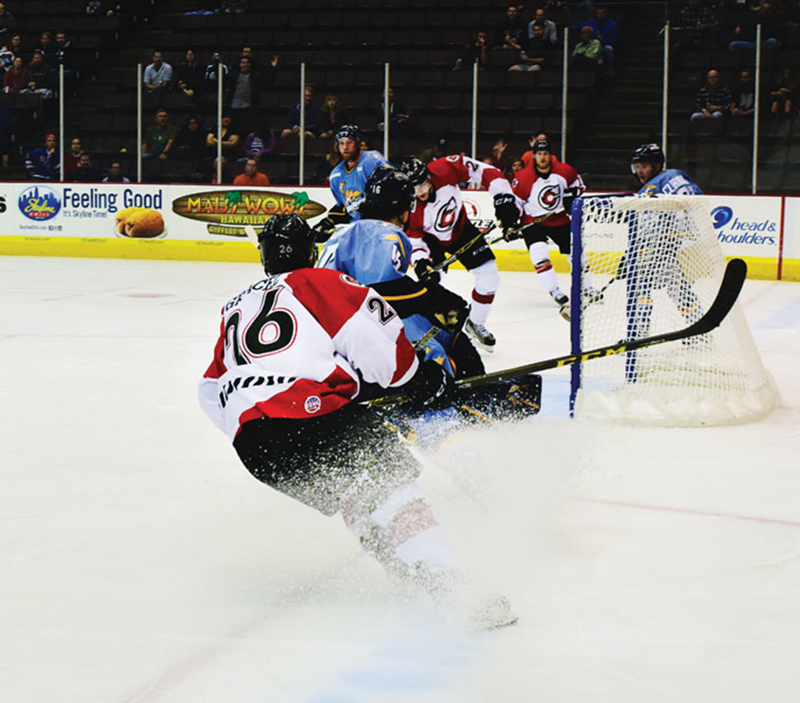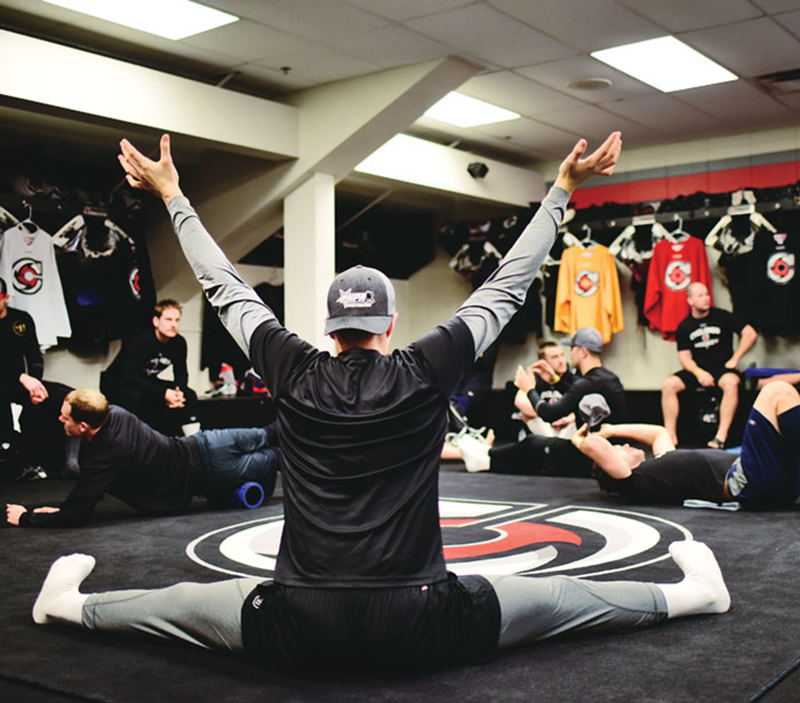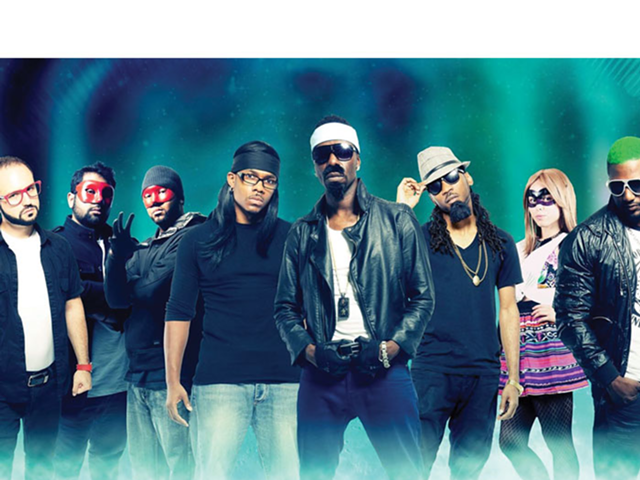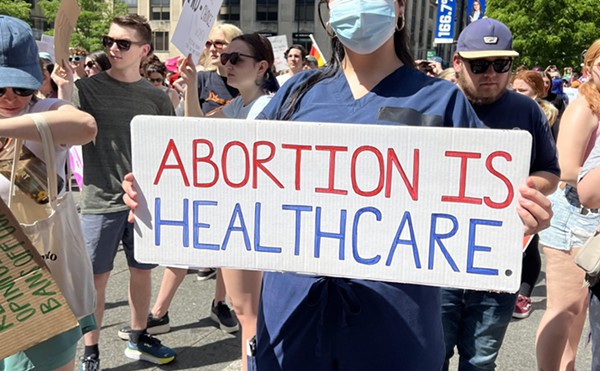C
hristiaan Minella is a Cincinnati kid, even if he didn’t grow up here. His mom, Melissa, is from the West Side. His dad, Dan, is from the East Side. Though Minella was born here, life took him and his family to Pittsburgh, which is where Christiaan spent his youth — and where he first put on ice skates, began carrying a hockey stick and handling a hockey puck. The game has brought Christiaan Minella back to Cincinnati. Minella is a 6-foot-2, 215-pound forward for the Cincinnati Cyclones, arguably the most successful pro-sports franchise in the city. The Cyclones aren’t the biggest name in a town whose sports teams include two major league organizations and four NCAA Division I athletic programs within a 40-mile drive of downtown (not to speak of a Big Blue basketball behemoth 100 miles to the south). But the franchise has found its niche in the sports marketplace and is doing quite well, thank you.Guys like Minella, who at the age of 30 could easily call it quits on a playing career but still has the desire to train for and play a season that, if all goes well, will last eight months, are at the heart of the Cyclones’ success. They play in the ECHL, a league considered two tiers down on the hockey pyramid from the National Hockey League, but a league that still produces an exciting brand of game with its mix of young prospects looking to move up and veterans who can’t dream of doing anything else in the world.They’ve got a solid fan base to back them up — a symbiotic relationship that has only grown stronger in the nine years since this incarceration of the Cyclones was born. The Cyclones win. That’s the bottom line for any fan supporting a team: What have you won for me lately? In the eight full seasons since these Cyclones have been in existence (this is the third franchise to hold the name “Cyclones” in Cincinnati) they’ve reached the conference finals five times, won their conference on three occasions and twice skated off with the ECHL’s big prize, the Kelly Cup. A crowd of 6,300 filling the lower bowl of U.S. Bank Arena to capacity welcomed them back on Opening Night this year. The Cyclones responded with a 5-1 win over the Toledo Walleye.“Even coming out for warm-ups you could sense
the excitement in the stands,” Minella said afterward.
“It really does help us.”
Minor league hockey works in this town, which
likes to consider itself big league. That doesn’t happen
everywhere, but it’s happened in Cincinnati.
WHY HOCKEY?
“Everybody says you’re competing with the Reds and you’re competing with the Bengals, and this and that, but we’re really not,” Cyclones Head Coach Matt MacDonald says. “We’re a hockey team. We’re a minor league hockey team, but I feel that we promote and we do things in a major league way. We’re a different sport entirely, and that’s where we find our niche. The fans that come out here come back, I feel, because they enjoy what they see and it’s a different game.”MacDonald, 32, knows the organization well. Among his seven seasons playing professionally, three were with the Cyclones. He helped them hoist their first Kelly Cup in 2008. Nearly 13,000 people showed up at U.S. Bank Arena on the Cup-clinching night. There were 13,483 in attendance when the Cyclones won their second Kelly Cup in 2010.
When his playing days were done, MacDonald joined the Cyclones as an assistant coach. He’s now in his second year as the head coach. Having seen the relationship from the perspective of both player and management, MacDonald knows there is more than one reason the Cyclones are successful.
“I think the biggest thing, number one, you have to have success, and then after that it’s the organization doing what they do,” MacDonald says. “They make it family-oriented. It’s family-friendly. It’s great entertainment. You can come out here and it’s just a little bit more than going to the movies or something for a family of four. You’re not bringing a family of four out here and paying $200.”
Average attendance has grown annually. Less than 1,900 people were showing up the first season (2006-07). Last year’s average was more than 4,300, and the Cyclones have gotten off to another good start this season. One of the beauties of minor league sports is the promotions. There are staples, such as $1 beer and $1 hot dog nights, but the Cyclones are also indulging the taste buds with a variety of specialty tasting nights.There will be four “Pucks & Pints” nights featuring local craft beer from Rhinegeist, Christian Moerlein and MadTree brewers, two “Pucks & Pinot” nights for the wine enthusiasts as well as a bourbon-tasting
night and a moonshine-tasting night.
Sean Lynn of the team’s marketing department reiterates the interest in attracting families to an entertainment, not necessarily sports fans to an
entirely new game most never played as kids. Which
is why promotions like Star Wars night or Ninja Turtles night with $1 pizza lean toward more mainstream themes than how the Reds might approach bobblehead night or team hall-of-fame inductions.
“We’re trying to convince Mom that it’s worth her time to pack up the kids in the car and come down here for a fun evening downtown,” Lynn says. “Our competition is a night at the movies or maybe even a family dinner.”Still, the ongoing development at The Banks — and fired up fans of the 8-0 Bengals — are good for business, Lynn says. “Cincinnati loves supporting a winner,” he says. “We’ve seen that on our end as well.”A LONG HISTORY OF HOCKEY IN CINCINNATI
Hockey nearly became a bigger part of Cincinnati’s cultural fabric. U.S. Bank Arena was built in the early 1970s with that hope. Cincinnati, which had successful minor league franchises with the Mohawks and Swords, narrowly lost out to Washington, D.C., and Kansas City in its bid for an NHL expansion franchise, but was promised a team in the next round of expansion. Instead of waiting for that next expansion, the Cincinnati Stingers of the upstart World Hockey Association were born. There was hope that the Stingers would eventually get an invite into the established NHL should the two leagues ever merge. There had been recent mergers in two other pro sports — football’s NFL and AFL, which included the Bengals, combined forces in 1970, while basketball’s NBA and ABA merged in 1976 — and the founders of the WHA were two men, Gary Davidson and Dennis Murphy, who had helped begin the ABA.But when the NHL and WHA finally merged in 1979, the Stingers were left on the outside of the deal.
Cincinnati has had its share of minor league hockey teams since then, most notably the second incarnation of the Cyclones, which played in the now-defunct International Hockey League from 1992-2001, and the Cincinnati Mighty Ducks, which played in the American Hockey League from 1997-2005. The town has a hockey history.
“I think (the NHL) definitely would have worked here,” says Don Helbig, who worked for three different Cincinnati hockey minor league organizations: the Tigers, Cyclones and Mighty Ducks. “When you look at places that have the NHL now — you have Nashville, Columbus, Tampa Bay, and even before the Stingers, Pittsburgh and St. Louis had teams. You see teams now in Anaheim and San Jose. You have to say, ‘Why not Cincinnati?’ ”
While some might take the numerous different teams that have called Cincinnati home as repeated failures, Helbig considers them all successes. They didn’t leave town or halt business because of a lack of fan support, Helbig says, but rather different circumstances ended their runs here.
“Each team that has come here has had its following,” Helbig says. “This has always been an entertainment town, and one thing all of these teams have done is approach the game as entertainment first and then the hockey. That might upset some of the die-hards, but even if the team isn’t that good, you’re going to have a good time.”
LIFE IN THE MINORS
The Cyclones have affiliations with the Nashville Predators of the NHL and the MilwaukeeAdmirals of the AHL. They are part of those teams’ developmental system, but not all of their players come exclusively from those organizations. Minella and defenseman Riley Weselowski are prime examples. They’re both former college players, Minella at Notre Dame and Weselowski at Bemidji State in Minnesota, and they’ve played professionally in various minor leagues throughout their careers. Minella actually played his first pro season with the Cyclones in 2010-11 before being traded to Wheeling.
Minella returned to the Cyclones last season. His mom and dad have since moved back to Cincinnati, so there is always a cheering section for him, but it’s bigger than he expected.
“The hockey fans are great here, they’re really passionate,” Minella says. “My girlfriend was actually talking to a group of fans on (opening night) that knew my entire story about growing up in Pittsburgh and playing at Notre Dame. She joked around that she learned something new about me. It’s a great group of fans. They really know their players and they support us.”
On the flip side are players like forwards Peter Quenneville, Nick Huard and goalie Brandon Whitney. They’re all just starting their pro careers and have aspirations of moving up the hockey pyramid.
Forward Eric Robinson makes a habit of spending extra time on the ice after practice working on various aspects of his game. He’s in his first full season as a pro after playing four years at Dartmouth College and then signing a tryout contract with Milwaukee late last season. The Admirals liked the potential in Robinson and sent him to Cincinnati to begin this season.
“I had a coach when I played junior hockey in Cedar Rapids named Mark Carlson, and he drilled into my head the need to do extra work like this,” Robinson says. “For me, individually, he talked to me about the potential I had. I never thought I had anything that he was referring to before I got there, so when he told me that was news to me. I took that opportunity to get better and see how much I could improve.
“It might be extra work and it might not always be the most comfortable feeling, but I really enjoy it,” he continues. “It’s something all professional hockey players should be doing.”
That work immediately paid dividends as Robinson scored three goals and had three assists in the first four games of the season. He was recalled by Milwaukee, along with fellow forward Max Gortz and defenseman Jimmy Oligny, on Nov. 4 for a brief stint, but then returned to the Cyclones as a loan on Nov. 7. Center Andrew Yogan, a player MacDonald believed would be a fan favorite because of his gritty style, was recalled by the Iowa Wild of the AHL after just one game with the Cyclones.
That’s life in the minor leagues. Players come and go. Maintaining stability and success isn’t easy, but the Cyclones have found their ways. Two seasons ago, they won their third conference championship before losing in the Kelly Cup finals in six games. Last season, they missed the playoffs for just the second time in eight years, but it was by just three points.
There is a high level of expectation from the organization, which plays directly into its overall success.
“We want to bring that pride back to that organization,” MacDonald says. “There’s many different ways to look at it, but the year before we made it to the Kelly Cup finals, and the year before that the conference finals. It’s like we built up and then had a drop off from making the finals. A little stumbling block, but we want to bring the postseason back to Cincinnati. That’s something you’re always striving for.”
The Cyclones play in the ECHL’s Midwest Division in the Western Conference along with the Indy Fuel, the Quad City Mallards, the Fort Wayne Komets and the Evansville IceMen. The majority of the their games will be against division opponents, but the ECHL stretches across the country, from New Hampshire (Manchester Monarchs) in the east to the southern Gulf Coast of Florida (Florida Everblades) and Anchorage (Alaska Aces) in the west.
The league’s expansion over its 27-year history to its current 28-team structure has raised the quality of play. Logan Shaw and Byron Froese are the latest Cyclone alumni to reach the NHL when they made their debuts this season for the Florida Panthers and Toronto Maple Leafs, respectively. Overall, there have been 28 players who have played for Cincinnati in the ECHL on their way to reaching the NHL.
Former Cyclone goalie Scott Darling played a pivotal role in Chicago surviving the early rounds of last season’s Stanley Cup playoffs on its way to winning a third championship in six seasons. David Desharnais led the ECHL in scoring as a member of the Cyclones’ first Kelly Cup championship. He’s now in his seventh season playing for the Montreal Canadiens
“It’s gotten to the point where it’s a top-end league. Years ago, the ECHL was looked down upon, but now I feel it’s a great league,” MacDonald says. “Everywhere we go there seems to be more and more fans coming out. The level of hockey is getting more competitive and the organizations around the league are making it very affordable and family-friendly. That’s what gets the fans in here.” ©
A TALE OF TWO PROMOS
The Cyclones’ promotional efforts follow a two-pronged philosophy: family-friendly weekends and beer-fueled weeknight deals. The latter is relatively simple: Tuesday home games offer $2 tall boys, and Wednesdays are $1 beer nights. The following are some of the more creative weekend offerings intended to attract Mom, Dad and the kids. Saturday, Nov. 21: Superhero Night: Dress as your favorite superhero and take photos with Marvel Comics characters. The Cyclones will wear specialty superhero jerseys. Kids receive a free Cyclones cape. Saturday, Dec. 12: Star Wars Night: Teams will wear Star Wars-inspired jerseys and characters from Star Wars: Episode VII - The Force Awakens will roam about. Saturday, Jan. 23: Princess Night: Dress like a princess; take photos with various princesses. Saturday, Feb. 27: Ninja Turtles Night: Dress like your favorite Teenage Mutant Ninja Turtle and eat $1 slices of pizza like a boss in a half-shell. Saturday, March 12: Weiner Dog Races: Dogs on ice during the first intermission. And it’s hot dog night.
